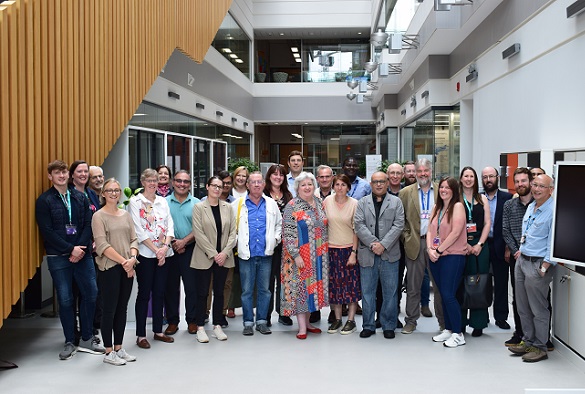Liverpool host LONGEVITY consortium

In 2020, the University of Liverpool was awarded more than £24.5 million ($32m) by global health agency Unitaid as part of a £30.5 million ($40m) global research consortium project to form the Centre of Excellence for Long-acting Therapeutics (CELT) and to lead the LONGEVITY project.
The LONGEVITY consortium aims to develop revolutionary long-acting injectable medicines for the prevention of malaria and tuberculosis and a single-injection cure for hepatitis C virus. These new medicines will be deployed in low- and middle-income countries (LMICs) where there are approximately 300 million people living with these diseases and 2 million deaths occur each year.
The new medicines have the potential to significantly reduce the burden of disease by providing innovative and sustainable solutions through long-acting technology.
-371x250.jpg) Recently, the CELT team hosted an assembly of global partners to engage in important discussions regarding the next steps for the project. On the agenda were key aspects of the implementation plan including product development, patient advocacy, commercialisation, cost effectiveness and regulatory activities.
Recently, the CELT team hosted an assembly of global partners to engage in important discussions regarding the next steps for the project. On the agenda were key aspects of the implementation plan including product development, patient advocacy, commercialisation, cost effectiveness and regulatory activities.
Revolutionary therapeutics
The project uses University of Liverpool spin-out company, Tandem Nano Ltd.’s (TNL), patented Solid Drug Nanoparticle Technologies to reformulate pre-existing orally administered drugs as long-acting injectables that require administration far less frequently, reducing issues around pill burden, stigma and relieving pressure on healthcare facilities and patients.
TNL has signed a non-exclusive worldwide licence agreement with The Medicines Patent Pool focused on the development of its proprietary SDN technologies covering the patents and expertise of promising LAIs. This licence agreement enables accelerated access to affordable, high-quality versions of these promising long-acting treatments to these countries. The medicines form a depot of drug at the injection site which slowly delivers drug to the bloodstream over long periods of time, meaning oral regimens requiring daily pills can be replaced by an injection that provides sustained drug exposure over a period of months.
This is why long-acting medicines are particularly suited for use in LMICs where access to healthcare is challenging for patients and healthcare facilities are stretched.
Significant progress
The consortium has reached significant milestones for each target disease.
Through multiple tests, CELT scientists have demonstrated that the target drug exposures should be met by the long-acting formulations for TB and Hepatitis C virus with a single injection, holding promise to deliver an entire course of medicine with just one administration.
CELT scientists have found new ways to create long-acting formulations for multiple existing drugs for these diseases. They have also worked with partners to conduct supporting research to understand the interests and attitudes of patients and healthcare providers and to de-risk translation of the medicines. The community has consistently demonstrated high rates of enthusiasm for long-acting medicines, and colleagues at Johns Hopkins University have conducted preclinical studies with drug-resistant malaria parasites to alleviate concerns over drug resistance.
Next steps
The coming years are set to deliver against important milestones for translation of these long-acting medicines, some of which are now being manufactured using Good Manufacturing Practice guidelines. In the very near future, the first medicines will undergo rigorous formal safety assessments to support the first clinical trials in healthy volunteers. The meeting in Liverpool has been critical to finalising specific strategies to accelerate these next steps in development.
Professor Andrew Owen, a co-director of CELT and principal investigator for the LONGEVITY project said “The pandemic has necessitated that previous meetings be held virtually and it has been inspiring to come together with long-term friends and collaborators for our first face-to-face consortium meeting.
Through the commitment of all of our partners, the LONGEVITY project has made outstanding progress despite the challenges of COVID-19 and we are excited to move to the next steps of translation in the coming years.”
The project is a global collaboration and involves international partners and collaborators in the Clinton Health Access Initiative, Johns Hopkins University, Queens University Belfast, Medicines Patent Pool, Tandem Nano Ltd., Treatment Action Group and the University of Nebraska Medical Center.